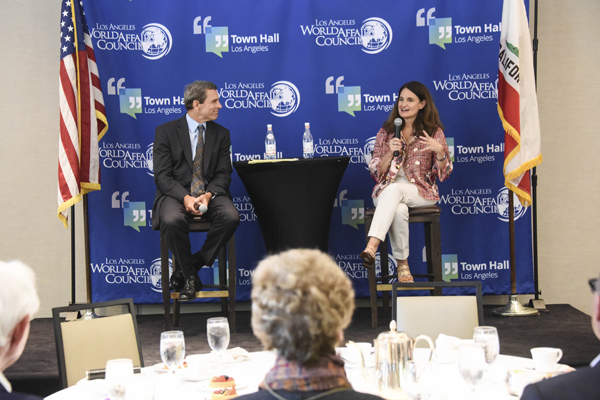 Elizabeth Economy (right), Director for Asia Studies at the Council on Foreign Relations and Terry McCarthy, President of the Los Angeles World Affairs Council
Elizabeth Economy (right), Director for Asia Studies at the Council on Foreign Relations and Terry McCarthy, President of the Los Angeles World Affairs CouncilChina is going through a third revolution, according to Elizabeth Economy of the Council on Foreign Relations – and it is a regressive one, she claims. Following the first revolution of 1949 under Mao that brought the communists to power, and the second revolution under Deng Xiaoping that started opening China’s economy up to the world in 1979, the current leader Xi Jinping has again overturned the system and is making for a more authoritarian and repressive state at home, surrounded by a virtual wall facing the outside world.
“In 2011 (the year before Xi came to power) China was an incredibly vibrant place, with billionaires taking trips to Taiwan to learn about politics,” said Economy, who is the C. V. Starr Senior Fellow and Director for Asia Studies at the Council on Foreign Relations. But Xi thought that “corruption, if not addressed, would be the death of the communist party and the Chinese state,” and so he instituted a stinging anti-corruption campaign. This has resulted in many arrests – and a 99% conviction rate. However it is clear that Xi has also used the campaign to his own political advantage, by knocking out his opponents, which has led to a lot of internal dissatisfaction. “Security surround Xi is extraordinary,” said Economy, and she said there had been “several coup attempts.” The most recent was associated with the now disgraced party chief in Chongqing, Sun Zhengcai, who was accused last year of allegedly trying to take over the leadership of the party – which would have been a direct challenge to Xi Jinping. “Behind the Great Wall there is a lot of conflict and dissatisfaction,” said Economy.
Xi wants to transform China from a manufacturing economy to an “innovation economy”, but the strict government controls on the internet and the flow of information from overseas runs against that goal. Although China is good at copying and of making incremental improvements, the country is not able to produce entirely new inventions. Economy quoted the artist Ai Weiwei, who said “it would be impossible to design an iPhone in China because it is not a product, it is an understanding of human nature.” However in terms of innovative uses of mobile technology, China is way ahead of the US. Mobile payment systems are standard in China, while still marginal in the US. “In China you can pay for everything with your phone.”
On the environment, China has made some progress, at least in the eastern cities like Beijing and Shanghai, after widespread discontent amongst the population against the toxic smog that cloaked their cities for weeks on end in the winter. But although pollution has been cut back along the coast, little has been done to improve the less influential cities in the interior. And in addition China has been exporting its polluting industries, said Economy, citing plans by China to build Kenya’s first-ever coal-fired power plant. “In contrast to Japan, China is exporting low-end stuff.”
Economy said that Xi’s grand objective is the “rejuvenation of the Chinese nation”, and as part of that it is adopting a far more muscular foreign policy, as seen in its militarization of bases on small islands in the South China Sea, and at the same time it is trying to influence other governments and institutions “in a way that reflects Chinese values.”
What should the US do? Economy said that the Chinese have been taken unawares by President Trump’s confrontational foreign policy with the threat of tariffs on trade and the passing of the Taiwan Travel Act by the US Congress. “We have broken their complacency.” However she cautioned that we should be working with our allies on trade issues with China, rather than threatening everyone with tariffs, and she said that withdrawing from TPP was a mistake because it was designed to maintain US leadership in the Asia-Pacific region.
Overall Economy said the US needs a long term strategy for Asia, and for living with China in particular. She rejected the idea that it is too late. “A lot of US analysts say “game over” for US influence in Asia – but this ignores the large players in Asia who have no interest in being in a Chinese sphere of influence.”
